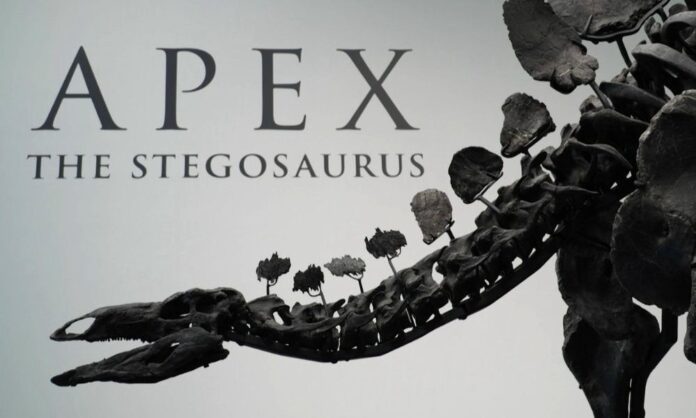The most complete stegosaurus skeleton ever found, dating back approximately 150 million years, was auctioned on Wednesday (17) for $44.6 million (R$244.7 million) at Sotheby’s in New York, setting a new record for a dinosaur fossil. Named “Apex,” this rare specimen stands at 3.3 meters in height and 8 meters in length, comprising 254 original fossilized bone elements out of the approximately 319 it had during its lifetime. After a lively phone bidding war, the room erupted in applause as the hammer fell, marking its purchase at a price well above the initial estimate of 4 to 6 million dollars. The $44.6 million paid by an anonymous buyer, which includes the auction house’s commission and taxes, far exceeds the amount paid for “Stan,” a Tyrannosaurus rex skeleton auctioned for $31.8 million in October 2020 (R$174.4 million at the current exchange rate), the highest amount ever paid for a Jurassic dinosaur fossil.
Given the size and degree of bone development, as well as evidence of arthritis on the vertebrae, researchers believe that the skeleton belonged to a large, robust adult who died of old age, alone, with no other fossils nearby and no signs of injuries on the body. The fossilized earth beneath the body also displays marks of its rough skin. It died “much like an old and tired dog or another animal ready to peacefully sleep forever”, curled up with its long tail wrapped under its body, as shared by Cassandra Hatton, head of the Science and Popular Culture department at Sotheby’s.
The stegosaurus, a well-known member of the armored dinosaurs group (Thyreophora), is characterized by the dorsal armor extending from its neck to its tail. The specimen sold was discovered in May 2022 on the lands of a paleontologist in Dinosaur, Colorado, within the Morrison Formation, a Jurassic geological zone located in the western part of the United States – spanning from Montana to Arizona and from Utah to Colorado. The sale of a dinosaur like “Apex” is only possible in the United States, practically the only country where what is found on private land belongs to the owner and not the State.
*With information from AFP


Comentários Facebook